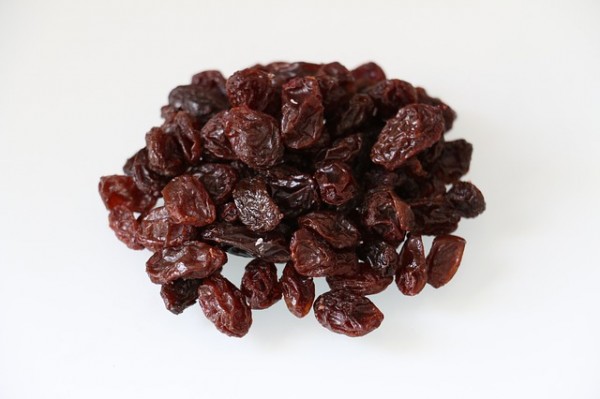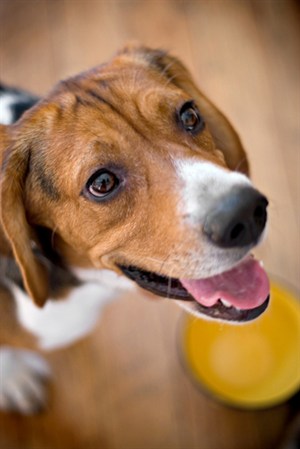We're here to help

What can't dogs eat?
It can be tempting to give your dog leftovers or to share your food with them, but what we consider to be tasty and perhaps even nutritious may be extremely dangerous, even poisonous, for our dogs.
Foods you shouldn’t give your dog include:
- Chocolate
- Onions, garlic and chives
- Alcohol
- Grapes and raisins
- Many more
Find out more below on our list of popular human foods dogs can’t eat.

1. Chocolate
Chocolate contains a stimulant called theobromine – a bit like caffeine – that’s poisonous to dogs. The amount of theobromine depends on the type of chocolate. Theobromine mainly affects the guts, heart, central nervous system, and kidneys and signs of theobromine poisoning will occur between four and 24 hours after your dog has eaten chocolate. You may see vomiting, diarrhoea, restlessness, hyperactivity and seizures. Read our in-depth guide on the dangers of chocolate to dogs.
2. Caffeine
Like chocolate, caffeine is a stimulant. Dogs are more sensitive to the effects of caffeine than people. A couple of laps of tea or coffee are unlikely to do any harm, but if your dog swallows a handful of coffee beans or tea bags they could be in danger. Signs and treatment of caffeine poisoning are similar to chocolate toxicity.
3. Onions, garlic, and chives
Eating these vegetables and herbs can cause stomach and gut irritation and potentially lead to red blood cell damage and anaemia.
Onions are particularly toxic and signs of poisoning often only occur a few days after your dog has eaten the vegetable. All forms of onion can be a problem including dehydrated onions, raw onions, cooked onions and table scraps containing cooked onions or garlic. Left-over pizza, Chinese dishes and commercial baby food containing onion, sometimes fed as a supplement to young pets, can cause illness. Many prepared foods (including takeaways), sauces and gravies contain onion or garlic powder.
4. Alcohol
Alcohol is significantly more toxic to dogs than to humans. When consumed, even small quantities of alcoholic beverages and food products may cause vomiting, diarrhoea, decreased coordination, central nervous system depression, difficulty breathing, tremors, blood changes, coma and even death. So, remember to keep alcohol well out of your dog’s reach.
5. Mouldy foods
Mouldy food, including bread, nuts and dairy products, contain lots of toxins that could make your dog very ill. Make sure you dispose of leftovers carefully and be careful to keep your food waste bin well out of your dog’s reach.

6. Grapes & raisins
Grapes and raisins can cause kidney failure in sensitive individuals. Dogs that already have underlying health problems are at the greatest risk and even tiny amounts of grapes or raisins can be extremely toxic in some cases.
Whilst the toxic substance in grapes and raisins has remained unconfirmed, recent research has indicated it might be a substance called tartaric acid. More research is needed before we can confidently provide a toxic dose, not least because the tartaric acid content of grapes and raisins is highly variable. We hope in the future to have a greater understanding of risk, but, currently, experts agree that there is no “safe” dose of grapes and raisins.
Our emergency vets have drawn up an advice guide on what to do if a dog eats grapes or raisins – or foods including them such as hot cross buns, mince pies and fruit loaf.
7. Macadamia nuts
Within 12 hours of ingestion, macadamia nuts can cause dogs to experience weakness, depression, tremors, vomiting and increased body temperature. These symptoms tend to last for approximately 12 to 48 hours. If you suspect your dog has consumed macadamia nuts note the possible quantity consumed and contact your vet.
8. Yeast dough
Yeast dough can cause gas to accumulate in your dog’s digestive system as a result of the dough rising. Not only can this be painful but it may also cause the stomach or intestines to become blocked. So while small bits of bread can be given as a treat – due to the fact that risks are diminished once the yeast has fully risen – never give your dog yeast dough.

9. Bones
While feeding your dog bones may seem like a good idea, it’s important to remember that dogs may choke on them, develop intestinal obstructions after swallowing pieces of bone, damage their teeth chewing them, or sustain internal injury as bone splinters can puncture your dog’s digestive tract.
If you do choose to give your dog a bone be sure to keep an eye on him while he tucks in and avoid giving cooked bones, which splinter more easily, or bones that are small enough to get stuck in their intestines. Eating large quantities of bone can often cause constipation, so try to monitor the amount your dog manages to consume.
Find out what happened to chocolate Labrador, Archie, when he eat an entire chicken carcass.
10. Corn on the cob
Corn on the cob may seem like a healthy table scrap to give your dog, but unlike most vegetables, it does not digest well in a dog’s stomach. If your dog swallows large chunks of the cob, or even whole, it can cause an intestinal blockage due to its size and shape. Signs to look out for are vomiting, loss of appetite or reduced appetite, absence of faeces or diarrhoea and abdominal discomfort.
Our story on Henry, a two-year-old black Labrador, demonstrates what can happen if your dog eats corn on the cob.
11. Xylitol
The artificial sweetener xylitol is found in many foods including some sugar-free gums, diabetic cakes and diet foods. It causes insulin release in many species (but not in humans) leading to potentially fatal hypoglycaemia (lowered sugar levels).
Dogs are extremely sensitive and even small quantities can cause toxicity. Some sugar-free sweets and gums have very high amounts per piece. Early symptoms of xylitol poisoning include lethargy, vomiting and loss of coordination. Seizures may also occur.
Xylitol has also been linked to fatal acute liver disease and blood-clotting disorders in dogs. This effect is not thought to be dose related so even very small amounts can be extremely dangerous. If you think your dog has eaten any xylitol seek urgent veterinary advice.
12. Milk
As dogs do not have significant amounts of the enzyme lactase that breaks down lactose in milk, feeding your dog milk and other milk-based products can cause diarrhoea or other digestive upset.
13. Blue cheese
Like other dairy products, dogs find it difficult to break down cheese, while eating large amounts of higher fat varieties can cause sickness and diarrhoea.
However, blue cheeses, such as stilton and roquefort, are particularly dangerous. Many contain a substance called roquefortine C, which dogs are especially sensitive to. Roquefortine C may cause vomiting and diarrhoea and potentially also tremors, twitching, seizures and a high temperature if eaten in large doses. If you think your dog has eaten blue cheese and is suffering from any of these clinical signs then you should seek emergency veterinary advice.
